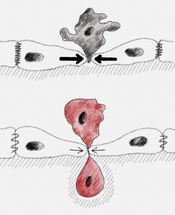Cellular protein may be key to longevity
Researchers have found that levels of a regulatory protein called ATF4, and the corresponding levels of the molecules whose expression it controls, are elevated in the livers of mice exposed to multiple interventions known increase longevity.
Elevation of ATF4, at least in the liver, seems to be a shared feature of diets, drugs, genes, and developmental alterations that extend maximum lifespan.
"Pathways that appear to change in the same way in many different kinds of slow-aging mice may provide helpful hints towards the design of drugs that keep people healthy longer by slowing most of the diseases of aging," said Dr. Richard Miller, senior author of the Aging Cell study. "ATF4 seems to be involved in control of aging from yeast to mice, so it's a good bet to be important in human aging, too."
Most read news
Other news from the department science

Get the life science industry in your inbox
By submitting this form you agree that LUMITOS AG will send you the newsletter(s) selected above by email. Your data will not be passed on to third parties. Your data will be stored and processed in accordance with our data protection regulations. LUMITOS may contact you by email for the purpose of advertising or market and opinion surveys. You can revoke your consent at any time without giving reasons to LUMITOS AG, Ernst-Augustin-Str. 2, 12489 Berlin, Germany or by e-mail at revoke@lumitos.com with effect for the future. In addition, each email contains a link to unsubscribe from the corresponding newsletter.





















































